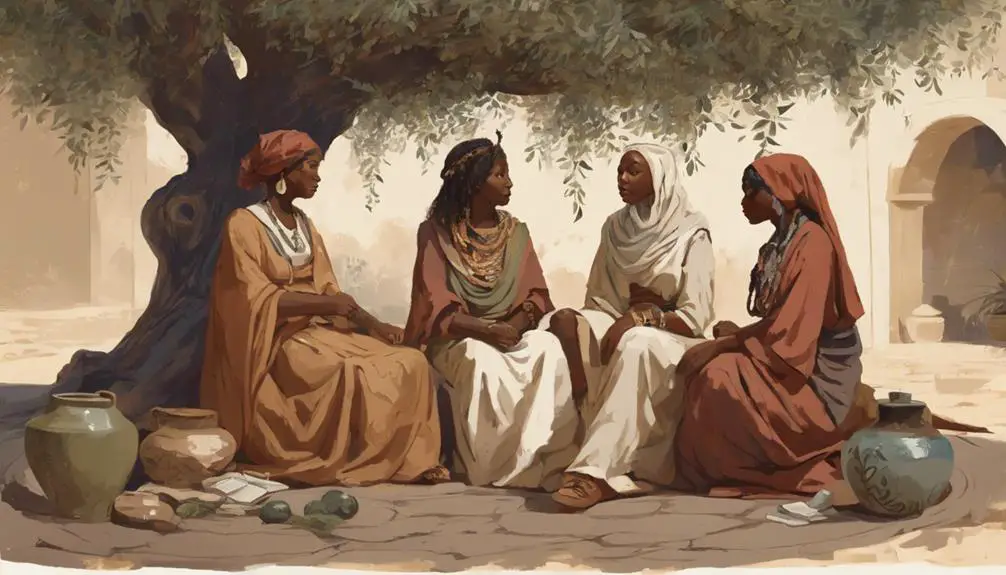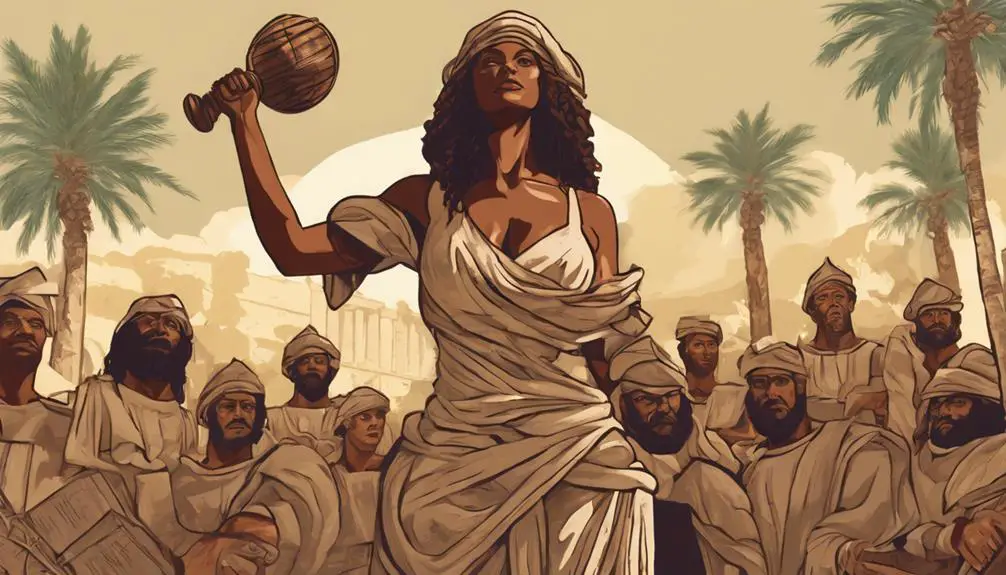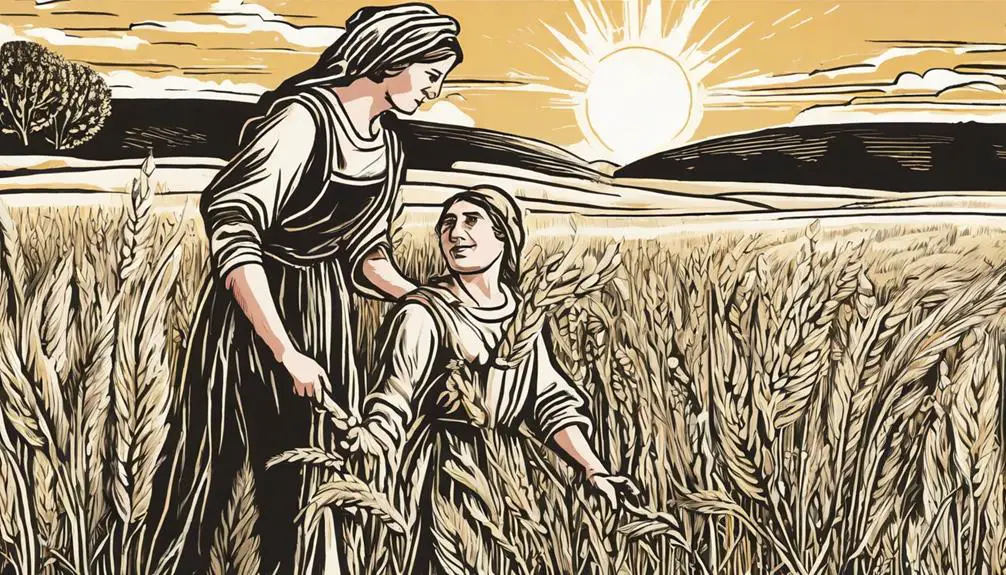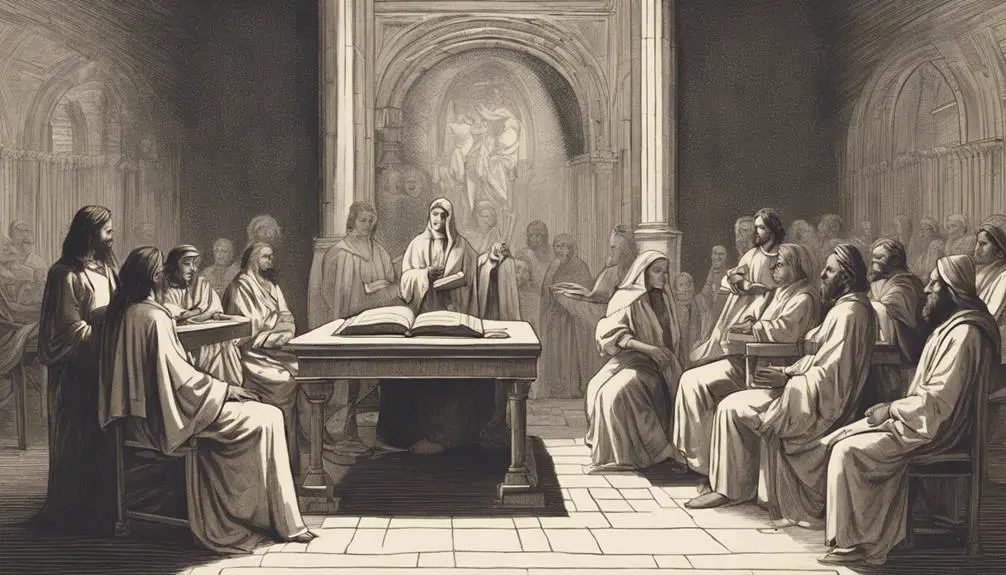Learn from the Bible's powerful female mentors and how their wisdom and virtues can inspire and guide you today.

Female Mentors in the Bible
Consider Deborah's leadership, Esther's courage, Ruth's loyalty, Mary's maternal influence, and Priscilla's teachings. These women from the Bible, each embodying unique virtues, have been pillars of inspiration through the ages.
But have you ever paused to assess their roles as mentors? Their stories offer more than historical or spiritual insights; they provide a blueprint for mentoring, empowering us to forge stronger relationships, spur personal growth, and foster spiritual development.
You may wonder, how can these stories be relevant today? Well, that's a fascinating exploration awaiting.
Key Takeaways
- Biblical women like Deborah, Ruth, Esther, Mary, and Priscilla serve as strong mentors through their leadership, loyalty, courage, influence, and teachings.
- These women demonstrated exceptional qualities such as strategic influence, sacrificial love, bravery in adversity, spiritual guidance, and effective mentorship.
- Their stories set a precedent for mentorship, highlighting the importance of wisdom, faith, character strength, and accurate teaching in guiding others.
- They provide valuable lessons and insights about standing up for what's right, remaining loyal in adversity, and the power of maternal influence and mentorship in faith.
The Leadership of Deborah

Often overlooked, Deborah's leadership in the Bible presents a compelling example of female mentorship, demonstrating wisdom, courage, and strategic planning in her role as a judge. You'll find her story in the book of Judges, where she's not only a judge but also a prophetess. Her prophecy and battle strategy play crucial roles in Israel's victory over Canaanite forces.
In the narrative, Deborah's prophecy comes to the fore. She predicts the defeat of the Canaanite general Sisera at the hands of a woman, a prophecy that's later fulfilled by Jael. This prophecy shows Deborah's ability to foresee events and her unwavering faith in God's plan.
Deborah's battle strategy is equally noteworthy. She sends for Barak, instructing him to assemble an army and assuring him of God's support. However, when Barak insists on Deborah's presence in the battle, she agrees but forewarns him that the honor of killing Sisera would go to a woman. This shows her strategic mind, her courage, and her ability to lead and inspire others.
Ruth's Story of Loyalty

Turning the pages of biblical history, we encounter Ruth, a woman whose remarkable loyalty paints a vivid picture of mentorship and commitment in adversity. Ruth's unwavering devotion to her mother-in-law, Naomi, is palpable even in the face of personal sacrifice. She chooses to stay with Naomi, despite the fact that she could return to her own people and remarry.
This loyalty, transcending cultural traditions, is a testament to Ruth's strength of character. She defies societal norms, deciding to abandon her own culture and adopt that of her mother-in-law's, even if it means living in a state of poverty. She does this out of pure love and respect for Naomi, a powerful display of her unwavering devotion.
Ruth's story is a lesson in loyalty, showcasing the lengths one can go for the ones they love. She teaches us that loyalty isn't just about sticking around when things are easy, but also standing by those we care about when they're in the midst of turmoil. In all, Ruth stands as a strong female mentor, her narrative serving as a timeless testament to the power of devotion and loyalty.
Esther: Courageous Queen

Just as Ruth embodies loyalty in the face of adversity, another biblical figure, Esther, exemplifies courage under extreme conditions. Esther's story is one of royal bravery, a young Jewish woman who becomes queen of Persia and uses her position to save her people from genocide.
Esther's influence is immense. Not only does she save her people, but she also sets a precedent for courageous leadership that has resonated through the centuries. You see, Esther's bravery isn't of the sword-wielding variety. It's a quieter, more internal kind of bravery. It's the bravery to stand up for what's right, even when it's not popular or safe.
Esther's courage lies in her willingness to risk her own life for the sake of others. She steps out of the protection of her royal status, revealing her Jewish identity to a king who's decreed the death of her people. Esther's bravery signifies an audacious faith and trust in God's providence.
Her story is a testament to the power of courage, faith, and the impact one person can have when they step up and stand for what's right.
Mary's Maternal Influence

Transitioning to the New Testament, we encounter Mary, the mother of Jesus, whose maternal influence shapes the course of Christianity. Mary's wisdom and maternal sacrifice are integral to her role as a biblical mentor.
You see, Mary's wisdom is demonstrated in her acceptance of the divine message, and her faith in God's plan. She embodies wisdom in her willingness to accept a path fraught with uncertainty, knowing the societal scorn and personal danger she'd face as an unwed mother in her time.
Her maternal sacrifice, too, is profound. Mary gives up her reputation, her safety, and ultimately, her son. Her sacrifice isn't merely physical, but emotional and spiritual. She endures the weight of knowing her son's fate, and the pain of witnessing his crucifixion. Yet, she remains steadfast, embodying the essence of maternal sacrifice.
Mary's influence extends to the disciples and early Christian community. She's present at Pentecost, symbolic of her continued guidance and support. Her maternal influence isn't bound by blood, but extends to all who follow Christ. The impact of Mary's wisdom and sacrifice is monumental, shaping the bedrock of Christian faith.
Priscilla: Teacher of Apostles

Moving further into the New Testament, you'll encounter Priscilla, a significant figure who emerged as a respected teacher of apostles, notably enlightening the eloquent and well-versed Apollos about the way of Jesus more accurately. Priscilla's doctrine was so profound that she could rectify Apollos' education, supplementing his understanding of Jesus' teachings.
Analyzing Priscilla's role in Apollos' education, we find a unique dynamic. Priscilla, along with her husband Aquila, provided Apollos with a more precise understanding of the gospel.
Here is a brief comparison in a markdown table:
Aspect |
Before Priscilla's Intervention |
After Priscilla's Intervention |
|---|---|---|
Apollos' Knowledge |
Limited understanding of Jesus' teachings |
Full understanding of Jesus' teachings |
Apollos' Ministry |
Preaching with limited understanding |
Preaching with full understanding |
Role of Priscilla |
Listener |
Mentor |
Priscilla's Doctrine |
Not yet shared |
Fully shared and understood |
The Result |
Incomplete gospel preaching |
Complete and accurate gospel preaching |
This table underscores the pivotal role Priscilla played, shifting from a passive listener to an active teacher, and the resultant transformation in Apollos' ministry. Priscilla's intervention in Apollos' education is a testimony to her profound understanding and ability to convey the gospel accurately.
Frequently Asked Questions
How Did the Cultural Context of the Time Influence the Mentoring Roles of These Women in the Bible?
Cultural influence shapes mentorship roles significantly. In ancient times, societal norms and expectations often directed a person's actions and interactions. You'd find that women leaders adapted their mentorship style to fit within these cultural confines. They'd have to balance their desire for guidance with societal acceptance, using tact and wisdom.
Essentially, your leadership would've been influenced by the customs, norms, and values predominant in that era.
Can You Provide Examples of Female Mentors in the New Testament Other Than Mary and Priscilla?
Yes, there are other female mentors in the New Testament. Lydia of Thyatira, often considered one of the unsung heroines, influences beyond scriptures by opening her home for worship.
Phoebe, a deaconess in Cenchreae, mentored many with her service.
You also have Junia, notable among the apostles, who's an example of a woman having a strong influence in the early church.
These women's impact continues to resonate in today's society.
How Does the Mentorship of These Biblical Women Compare to Modern Concepts of Mentorship?
When comparing mentorship styles, you'll find that biblical women's methods aren't too dissimilar from today's. They guided others through example, wisdom, and faith, much like modern mentors.
But with modern biblical interpretation, there's a deeper understanding of their influence. Today, mentorship includes formal training and structured programs, which weren't present then.
Yet, the core principles of trust, guidance, and shared wisdom remain the same.
Are There Any Biblical Accounts of These Women Mentoring Other Women Specifically?
Yes, there are instances of women mentoring other women in the Bible. For example, you'll find Mentorship Methods used by Biblical Matriarchs like Naomi, who guided Ruth. These women taught life skills, faith, and societal roles to younger women.
This type of mentoring isn't vastly different from modern mentorship, where knowledge and wisdom are imparted from one generation to the next. It's an age-old tradition that continues today.
What Can We Learn From the Negative Consequences Faced by These Women Due to Their Leadership and Mentorship Roles?
When analyzing the negative outcomes faced by leaders and mentors, you can learn a lot about mentorship challenges and leadership backlash.
It's important to remember that facing adversity often fosters resilience and growth.
The difficulties encountered can provide valuable insights into how to navigate complex situations, manage conflicts, and remain steadfast in your convictions.
These lessons can be applied in various domains, not just in the context of female mentors in the Bible.
Conclusion
As you've journeyed through the biblical narratives of Deborah, Ruth, Esther, Mary, and Priscilla, you've encountered powerful female mentors. They showcased leadership, loyalty, courage, maternal guidance, and theological prowess, each leaving an indelible mark on their world and ours.
May their stories inspire and challenge us, reminding us that female mentorship isn't only valuable but is also deeply embedded within our biblical heritage. These women indeed epitomize the potent influence of female mentorship.



Sign up